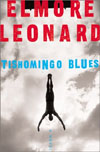
Comment
on this story
|
 |

Elmore Leonard strikes again...and again
by Paul Lewis
Elmore Leonard began his career writing westerns. Although I've never read any of that early work, if his more modern fiction can be a gauge, I'm betting there were very few white hats on display in his take on the genre. While he often writes about lawmen, they're not necessarily his protagonists, and even if they are, they're not always interested in simple justice.
Leonard's work fits into a gray area that might confound the more conventional crime fiction buffs. It's not truly James Ellroy hard-boiled, as it has too much light-hearted and situational humor, and it's not truly Carl Hiassen comedic, as it's far too edgy. If you're the kind of reader who likes enough character to keep the plot centered, and enough plot to hook you but let you draw your own conclusions and fill in your own gaps, plus lots of sharp, believable dialogue, Leonard is your guy.
His newest, Tishomingo Blues (William Morrow, $25.95), is about a former professional, now carnival-circuit, high diver, Dennis Lenahan, who convinces the manager of Mississippi's Tishomingo Lodge and Casino to book him for a few weeks at the casino's opening. He's barely set himself up  when, at the top of his 80-foot perch, he witnesses a murder by the so-called Dixie Mafia. The only other witness is Robert Taylor, a Delta blues-loving, Jaguar-driving con man with ties to Detroit, who wants Dennis to know that he knows what happened. Robert is in town to see manufactured-home magnate Walter Kirkbride to present him with a mysterious photograph. He's obviously running a scam, but is Dennis part of it? when, at the top of his 80-foot perch, he witnesses a murder by the so-called Dixie Mafia. The only other witness is Robert Taylor, a Delta blues-loving, Jaguar-driving con man with ties to Detroit, who wants Dennis to know that he knows what happened. Robert is in town to see manufactured-home magnate Walter Kirkbride to present him with a mysterious photograph. He's obviously running a scam, but is Dennis part of it?
That's the set-up. The backdrop is not only the South, but specifically an epic Civil War reenactment of the Battle of Brice's Crossroads wherein all the plot points converge. Robert's boss, Germano "Jerry" Mularoni, with his own interests in Mississippi, is roped into portraying General Ulysses S. Grant in the battle. The real mob forces are in the Union army, and the Dixie Mafia forces are on Confederate side. Yes, there's going to be trouble.
Leonard has called Blues his favorite of the books he's written, and one gets a sense it's not just hyperbole for him. His 37th novel (not including a short story collection and a piece written for the Internet) is appealingly pulpy, in that good, rough-hewn way. You get the sense that the writer is feeling his way through the story almost as the reader does, exploring his landscape along the way. While Dennis pales in comparison to Robert Taylor's vitality, he makes for both a convincing everyman, introduced to a world he hadn't much considered before, and as a pragmatic thrill-seeker who can live in that world because of the risks he takes as a showman ("Dennis dug into the pocket of his jeans for the Kennedy half dollar he kept there and dropped it on the polished brick surface of the patio. Darwin looked down at it and Dennis said 'That's what the tank looks like from the top of an 80-foot ladder.'"). The sense of Leonard flat-out playing is palpable, and that should definitely put a grin on the faces of long-time fans and make some new ones.
Pagan Babies (Harper, $7.99), while featuring neither a setting quite so close to home nor an entertainingly colorful event like a Civil War battle, is actually a bit more of a satisfying read. Father Terry Dunn is a young, unconventional priest stationed in Rwanda, site of civil unrest and slaughter between the warring Hutu and Tutsi tribes. When he returns home to Detroit (Leonard's home, by the way), his brother Francis, a personal-injury lawyer, introduces him to Debbie Dewey, a recently released ex-con and wannabe stand-up comedian who had done detective work for Francis before hitting her ex-husband for bilking her of all her money. Terry and Debbie immediately have chemistry, and decide to visit ex-husband Randy Agley, who runs a mob-haunted restaurant in Detroit. It seems Terry is collecting money for the starving children of Rwanda—or is he?
The typical cast of colorful characters unfolds from these connections, and their relationships feel organic and convincing. There are mobsters Vincent Moraco, who's shaking down the restaurant; Tony Amilia, the don with cancer; Johnny Pajonny, small-time thug and ex-friend of Terry, and Searcy J. "Mutt" Bragg, a dumb Indiana cracker who's low man on the organized-crime totem pole. It's not long before someone wants more money from someone else or someone wants to kill someone else so they can keep their money.
Babies, perhaps because it's actually on Leonard's own turf, seems a little more vital and immediate. The sense of fun and black humor is there, but it's tempered with real-world atrocities and more honest emotion. The plot, which with Leonard always seems more of a suggestion than a road map, is even twistier, the scam more elaborate, and if there's one thing that makes crime fiction fans (and perhaps authors like Leonard) eminently happy, it's a labyrinthine con game. There's no grift in these words, however; Elmore Leonard continues to produce compelling, page-turning work.

April 18, 2002 * Vol. 12, No. 16
© 2002 Metro Pulse
|